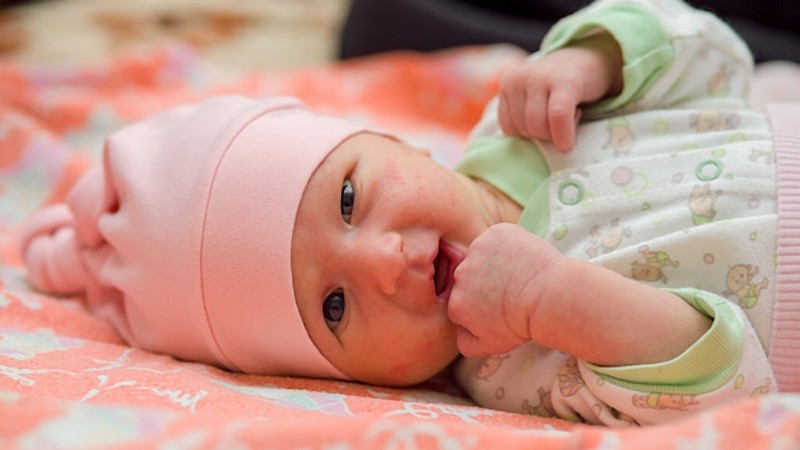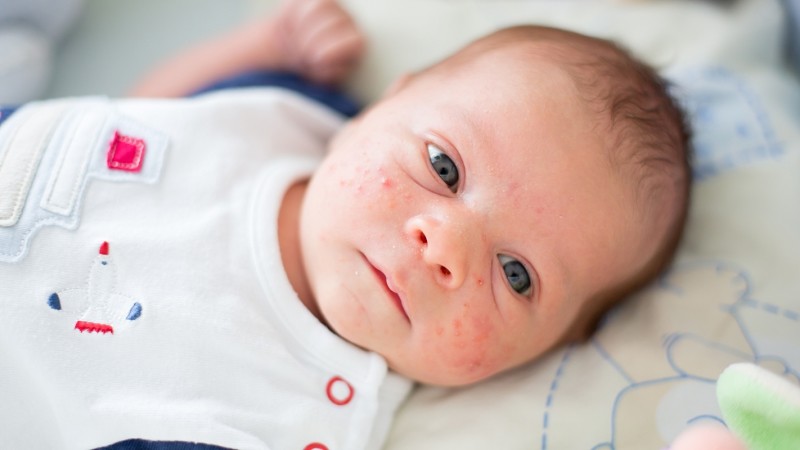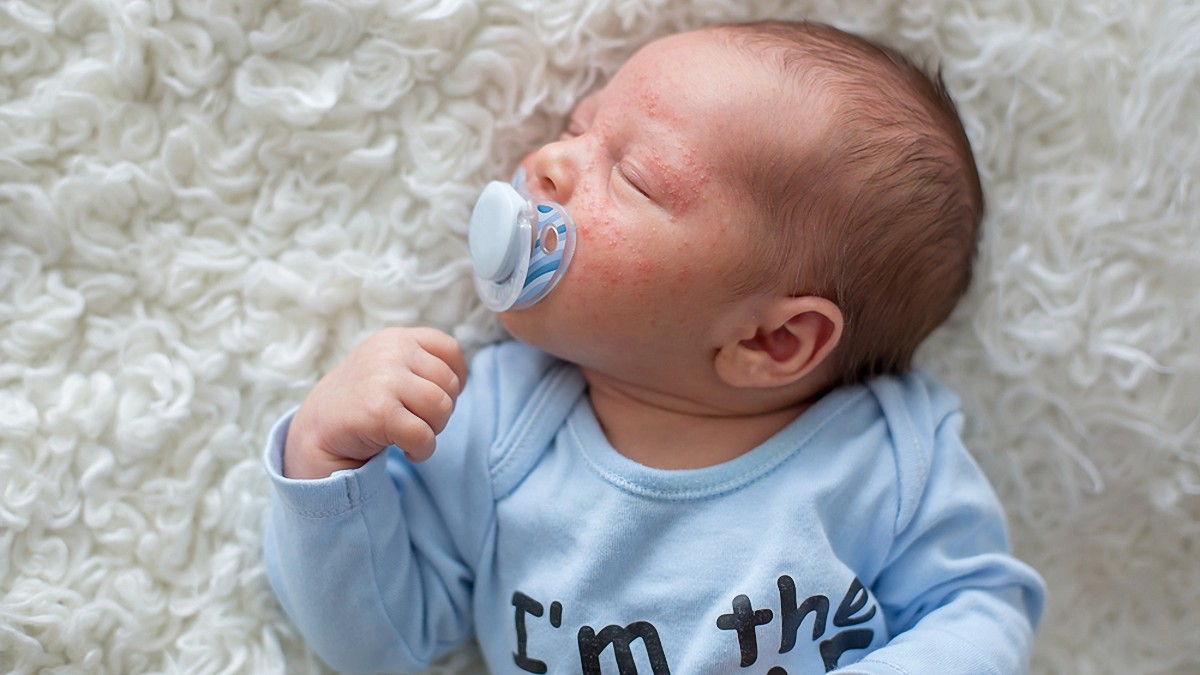Did you know that around 40% of newborns have baby acne? Although you might not be happy that your newborn has acne, you shouldn’t be worried — a lot of babies develop this condition.
Many new parents don’t expect a problem like this. Chances are you thought you wouldn’t have to deal with skin conditions up until your baby reaches teen years.
However, baby acne is real and common. The truth is acne won’t look good in photos, but, as we will explain, it’s nothing to worry about.
Why Baby Acne Appears
To begin with, let’s answer a question that’s bothering so many parents — what causes baby acne?
Well, there’s no other way of saying it — moms are the ones to blame. To be more precise — baby acne is caused by mom’s hormones.
A mommy and a baby share everything before birth. Because of that, a newborn that’s just a couple of weeks old still has their mom’s hormones in the blood.
As a result, a newborn’s oil glands use leftover hormones and produce newborn acne. Most commonly, infant acne appears on the:
- Chin
- Forehead
- Cheeks
- Eyelids
Moreover, infant acne doesn’t appear only on the baby’s face. As a matter of fact, neonatal acne can also appear your baby’s neck, back, and even chest.
In case of a baby acne outburst, we advise you not to panic. To repeat, although it’s not attractive, the condition isn’t dangerous.
What additionally contributes to neonatal acne is the baby’s skin defensive mechanism — the lack of it, to be precise. Newborns are highly sensitive; small dirt particles can easily irritate your baby’s gentle skin.
So, to sum up — what causes baby acne? The answer is a combination of mommy’s hormones and common dirt.
How to Make Baby Acne Disappear
The follow-up question many young parents have is — how do we get rid of baby acne? We know that you won’t like the answer, but there’s not much you can do about it.
For starters, do not try the old fashion way — squeezing. The fact is you will only worsen the condition, and your baby will be in pain.
Moreover, actions like scrubbing, for example, will only additionally irritate your baby’s skin and probably cause an outbreak of acne.
A lot of parents think that washing the area covered in newborn acne with soap will make the situation better — it won’t. Your newborn’s skin is too gentle for soap chemicals. A baby lotion won’t work either, and neither will grown-up acne products.
As a parent, the only thing you can do is rinse. So, rinse the infected area with warm water without scrubbing. You can wash your baby’s face this way up to three times per day.
In addition, consult your baby’s pediatrician. The doctor will be able to recommend a safe product that won’t damage your newborn’s health.

Is Baby Acne Similar to a Rash?
Although the two skin conditions may look alike, acne and baby rash on the face is not the same thing.
Usually, young parents presume that infant acne is actually milia, another common baby condition. Unlike baby acne, milia manifest as small white bumps. In some cases, whiteheads appear as well.
Similarly, milmia isn’t a problematic condition — it appears when keratin gets trapped under your baby’s skin.
While we’re on the subject, it’s smart for you to know how a baby rash looks — we’ll guide you through the four most common types.
First of all, be on the lookout for a rash caused by the heat. The bumps look almost the same as acne, but they will appear in different places. Other than your baby’s face, the heat rash will spread onto the legs, arms, diaper area, and chest.
Secondly, there’s also the newborn eczema. Unlike infant acne, it appears in patches — look for them on your baby’s cheeks and scalp. In case it spreads, the condition will also appear behind your newborn’s knees and on the inside of elbows.
Thirdly, you might have to deal with the diaper rash. Because of a combination of moisture and lack of air, your baby might develop a rash in the diaper area.
Finally, get familiar with cradle cap. Other than the usual red bumps, the cradle cap also comes with yellowish skin. If something like this appears on your infant’s skin, chances are it’s seborrheic dermatitis otherwise known as cradle cap.
Should You Call a Doctor?
Considering that all the conditions we mentioned may look alike to new parents, do consult your pediatrician.
A medical expert will tell you exactly what you’re dealing with. In case it’s not baby acne, a doctor will prescribe an appropriate treatment.
Besides, once you consult an expert, and when they tell you there’s nothing to worry about, your mind will be at ease.
When Will Baby Acne Go Away?
The main reason why you shouldn’t be alarmed is that baby acne will disappear on their own.
Mommy’s hormones will go away in time. As a result, your baby will have a clear, smooth skin up until they turn six months. Sometimes, the condition goes away even sooner.
It’s also important to know that baby acne doesn’t leave scars. Once it clears out, the condition will leave your newborn’s skin intact.

Final Thoughts
New parents often panic, especially if they are young as well. At the first sign of irregularities, you will get an urge to run off to the nearest hospital.
Although your care for the baby is admirable, we advise you to calm down. Babies are more resilient than you know — they can survive more than just a simple acne breakout.
Naturally, you should always consult your pediatrician — do this before taking any action.
A quick reminder — your child will be a baby only for a short time. Instead of stressing out about baby acne — which will go away before you know it — use this time to bond with your child.

